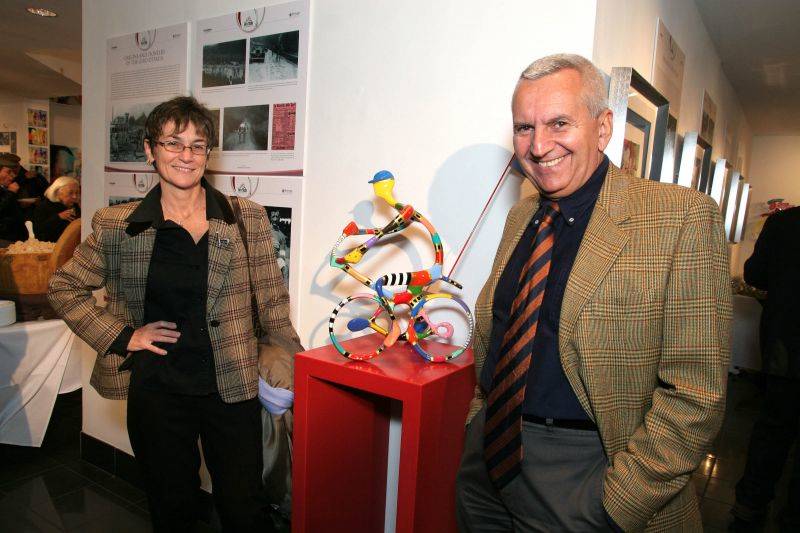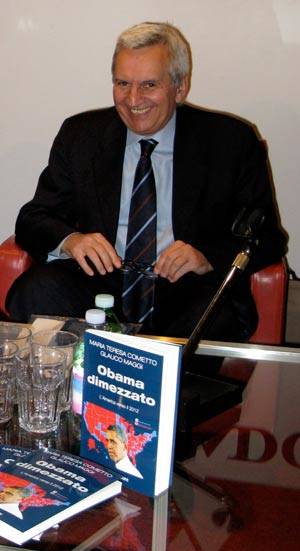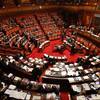Halved Obama
Maria Teresa Cometto (Corriere della Sera) and Glauco Maggi (La Stampa) are two Italian journalists who know best about America. They have been observing it and studying it for the Italian audience since 2000, when they first moved to New York. They made it on time to see the Twin Towers, then watched them crumbling down in shock on 9/11. Now Cometto and Maggi have just published “Obama Dimezzato: L’America Verso Il 2012” (literally: Halved Obama: America towards 2012), an essay that sizes up Obama’s mandate after the midterm shock, reviewing the president's achievements so far as well as the promises he broke, and making projections for the 2012 elections.
i-Italy has been talking about “Obama Dimezzato” with co-author Maria Teresa Cometto, while Glauco Maggi was busy presenting the book in Milan.
“Halved Obama”: what does it mean?
The title refers to the 2010 midterm elections that marked the first half of Obama’s presidential mandate. Obama is halfway through the mandate, but he has also lost half of the Congress. The super-majority he could count on since he was elected in 2008, which allowed him to push financial and healthcare reforms, has, in fact, been halved. The title also refers to how Obama’s approval rating dropped below 50% before the recent blitz against Al Qaeda’s leader Osama Bin Laden. In January 2009, Obama’s approval rating was over 70%, so the slump has been visible. Bin Laden’s death bumped the rating up again; it went up 9% over the last 10 days.
The 2010 midterm elections dealt a severe blow to president Obama. But could the President have lived up to his voters' high expectations?
Expectations of Obama’s presidency were quasi-messianic, indeed, but he was the one fueling them in the first place. For example, in one of his speeches he declared that after his election the current rise in sea level would decrease because of the successful struggle to end global warming. The enthusiasm was far too high and it was realistic to expect that it would deflate. However, there are other cases where presidents who received a severe “shellacking” from midterm elections and went on to get re-elected, with Clinton being the most recent example. Obama has plenty of time to catch up, especially since the GOP hasn’t yet proposed any credible candidate to challenge him.
The book features a section called “Obama’s report”. How did he score so far?
It depends on how you read the report. The two most important Obama reforms, specifically financial and healthcare reforms, are still very controversial. Besides, healthcare reform will become fully effective only after the next election. This means that Obama could benefit from a time lapse in which the negative effects of the reform, such as the rise of health insurance costs, will not be felt until after his term ends. However, this also means that the positive effects of the reform, such as healthcare access for low-income people, will not be perceptible either. The financial reform has not yet been fully implemented. Several experts are already criticizing it, saying that it is affecting Wall Street’s competitiveness vis-à-vis expanding markets such as China. Along with that, there are Obama’s broken promises, the most glaring being the closure of Guantanamo, energy reform, and lobbying reform. Obama has been working on his electoral campaign for 2012 for two months now. This time, as reported on politico.com, he will rely on large-dollar donors and bundlers much more than in 2008. What happens in this twilight zone where lobbyists operate is often unclear and suspicious. Obama failed the test this time.
Midterm elections clearly showed that Conservatism in the US is not dead, nor are right-wing values. Can you tell us more about this?
America is definitely a “right nation.” Patriotism, religion, and family values are at the core of the American identity and the majority of the electorate shares these values. In the first two years of his mandate, Obama’s policy has been definitely left-oriented, especially when we consider the healthcare reform. Looking forward to 2012, Obama needs to win more center-right voters. We saw an attempt to do so when he accepted a compromise with Republicans on the tax bill. It was a smart move, as economists agree that rising taxes now would have a terrible impact on the already troubled American economy. Obama’s drawing on the idea of “American Exceptionalism” in his speech on Bin Laden’s death can be seen as another signal to the electorate that he needs to bring to his side.
Will the death of Osama Bin Laden be a game-changer during 2012 elections?
It surely has been a game-changer as of now. Americans were pleased with the success of their commander-in-chief who showed the world what America is capable of, but the road to the 2012 elections is still long. The bad news that Obama had to give Americans right after the good news of Osama’s death is that the unemployment rate bumped up to 9%. This is the darkest cloud over Obama’s head. He knows that his re-election depends on the economy’s condition and on the nation’s faith in their financial stability.
After midterm elections there were rumors the Democratic Party would have gone through primary elections for 2012. Is it a realistic scenario?
It is still a possibility, as the most left-wing area of the party is very dissatisfied with Obama’s broken promises, especially as far as Guantanamo and his pledge to withdraw U.S. military presence in the Middle East is concerned. But it also seems unlikely to happen after the elimination of Osama Bin Laden. With this important achievement, Obama could fully reaffirm his leadership in the party. If anyone would want to challenge him from inside the party today, it would be an attempt at suicide.







































i-Italy
Facebook
Google+
This work may not be reproduced, in whole or in part, without prior written permission.
Questo lavoro non può essere riprodotto, in tutto o in parte, senza permesso scritto.